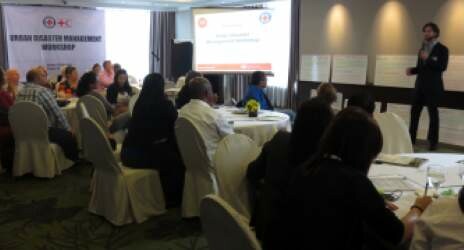
Law has a significant role to play in the urban context, as a means to stop creating new risks and to manage existing ones. The role of law in urban disaster management featured as a key topic during a week-long Urban Disaster Management workshop in Manila in August. Hosted by the Philippine Red Cross in collaboration with the International Federation of Red Cross and Red Crescent Societies (IFRC), this workshop brought together National Red Cross and Red Crescent Societies from across the region to identify and prioritize areas for improved future programming in urban disaster management.
A session run by the IFRC Disaster Law Programme with a guest speaker from the Philippines Shelter Cluster highlighted the role that National Societies can play in influencing the development of law and policy to effectively address urban disaster management issues. The topic of informal settlements was featured during these discussions, given that the booming population in many big cities has seen an increase in such settlements. Many of these communities are located in hazard prone or high risk areas, where urban land use planning has not been able to keep up with population growth. As a consequence, the expansion of informal settlements in high-risk areas remains rapid, leaving people vulnerable to natural hazards and health and safety risks.
Many National Societies have already taken great strides to work with their governments and other partners in reviewing and developing laws for disaster management and response, and participants discussed how the same approach can be applied to influencing laws and procedures relevant to the urban context. . In addition to this, they discussed the importance of effectively implementing laws, and the impact this can have in an operational context. “Many countries already have lots of strong laws in place, but often they are not mutually reinforcing .This can create operational problems on the ground. We therefore need to advocate for a system of review and better implementation of the relevant laws, and complementarity between them”, remarked Ms. Donna Mitzi Domingo Lagdameo from the Red Cross Climate Centre.
The idea that not one single actor in the urban context can manage disaster risks on their own was echoed throughout the workshop discussions, and how engaging in disaster law advocacy serves as a vehicle for working with key partners on issues of common concerns, and strengthening these partnerships in the process.
The workshop incorporated many different sessions on urban disaster management issues, ranging from volunteer management, to cash transfer programming, lessons learned from the Haiyan response and mainstreaming environment and climate change response in urban humanitarian action. In the end, disaster law in the urban context was listed among the top four priority areas to address, as identified by the participants. The important role that National Societies play the development of strong legal and policy frameworks, and as a voice for the most vulnerable, was a key message coming out of the workshop discussions. Their unique positon, as a bridge between communities and national/local authorities makes them well placed to promote understanding, awareness and implementation of the relevant frameworks for urban disaster management at all levels. This is a key message that will underscore future work in urban disaster management for the IFRC and National Societies, and feed into preparatory discussions for several upcoming events, including the Asia Pacific Regional Conference in Beijing in October.